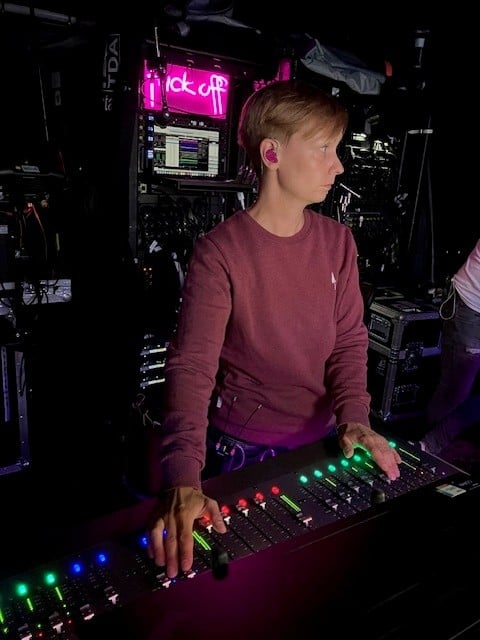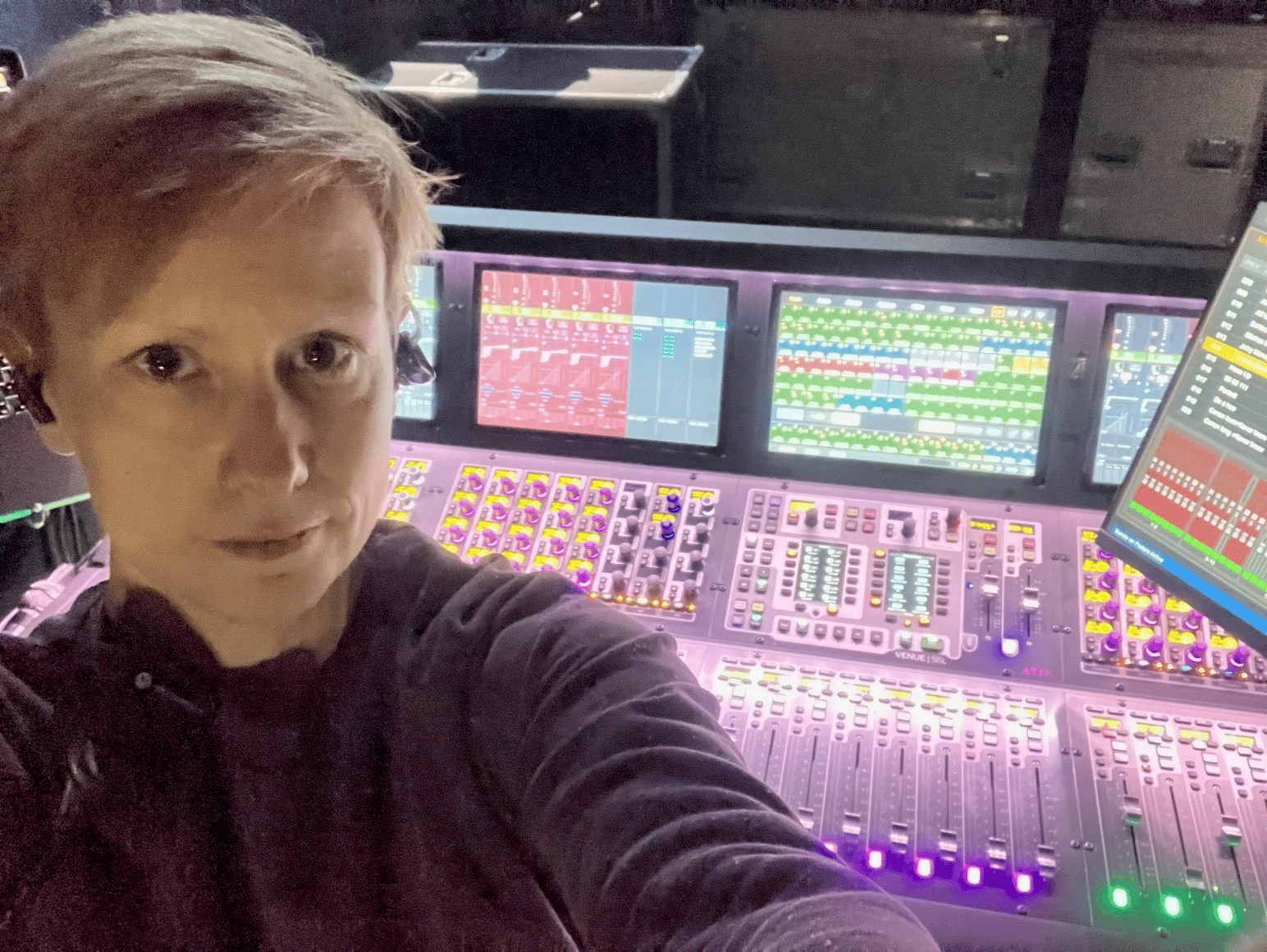“Make friends with the self-evident fact that this is exactly how you are allowed to be in this room.”
“Okay, but what do you want me to do there? Carry boxes that are as heavy as I am?” That was Sabrina Sudhoff's flippant answer when a friend asked her in the 1990s if she would like to help out at the “Kulturfabrik Krefeld”, a volunteer-run venue on the edge of the Ruhr region in Germany. Still, Sabrina decided to go – a step that would eventually lead her to some of Europe’s biggest stages.
Nothing was clear at first
But that wasn’t obvious back then, just like nothing really was at the time. Today, Sabrina chuckles: “At that time, I had absolutely no idea where I was headed after school. I studied English and German studies, but mostly out of sheer lack of direction.” And at the Kulturfabrik, it wasn’t about hauling boxes at all, as Sabrina quickly found out. It was about the team, the collaborative work, about making something possible that, a few hours or days later, would thrill or touch people: “It’s not just some random service you provide somehow. But I only truly realized that much later. In the evening, you’ve got a thousand or even ten thousand people standing in front of the stage. And they’re here because we make it possible – because it’s our craft that lets all these people have that show experience.” This sense of teamwork, that odd sort of magic – Sabrina stuck with the Kulturfabrik, but not as a helping hand hauling boxes.
“Show me how it’s done, and I’ll do it for you.”
Instead, she looked around for people who were open to getting some help. That’s how she came across lighting engineer Stephan Aue, who would show up at gigs with his own lighting equipment. “Show me how it’s done, and I’ll do it for you,” she said. Soon she was placing and wiring up scanners on stage. And that was exciting – really exciting. Not long after that, she started mic’ing – “and once you’re doing all that, you obviously have to figure out how signal paths work. It was driven mostly by curiosity, and there was always something new to do. And then one thing led to another.” And just a short while later, in 2000, Sabrina was among the first to complete an official apprenticeship program for event technology specialists.
Before that, there was no real formal training in Germany: “The live events sector was basically made up of people who found their way into the job through contacts, sharp elbows and willpower. Backstage was dominated by autodidacts and people coming in from other fields.” Back then, it was not unusual to hear lines like, “Why should I show you how to do that? You’ll just become my competition…”
“Sometimes I miss that sparkle in people’s eyes”
Today, the ways into the live industry are much broader, including through university degree programs. Theoretical knowledge has become more important, but practical and market experience remain crucial.
“In the end, we can’t hide from the fact that the live events sector has turned more and more into an industrial branch that now has to meet industrial standards, too. That shifts what’s expected in terms of training and qualifications.” The way people interact, the whole culture, has changed, too. “Most of us grew up in very small, family-like businesses, often just a handful of people. Today, successful providers are companies with 80 or 200 employees. That creates a different workday, a different way of organizing things — everything keeps getting bigger, and you can’t just scale that back. That’s how the market is now. Sometimes I miss something there. For example, the sense of feeling responsible as a team, pulling together to make it work. Back then, that ‘the show must go on’ attitude was probably taken too far. But sometimes I notice certain tendencies, like a ‘just-do-what-you’re-told’ attitude, or that younger colleagues see the job as just a profession — and much less as a calling. Back then, we didn’t do everything perfectly either, and we took risks — some of it was nonsense. But I do miss that sparkle in people’s eyes sometimes. You can’t just manage events; you have to feel them — and that affects your craft and the care you put into your work.”

The key to monitoring? “Presence.”
One focus of Sabrina’s craft is monitoring, nowadays mainly in-ear. Is there a golden middle ground for doing the job credibly and cleanly? How do you handle all the different needs and sensitivities — what’s the secret?
“Presence. The artist is up on stage, looks over at you at some point — and you’re there. Every single moment. And I understand the signals, no matter how cryptic they are. If you need me: I’m there. And if, during rehearsal, the feedback is ‘It sounds kind of weird today,’ then it’s my job to translate that into an option: Better like this? And then we find a direction together. And if you radiate calm while doing that, it helps a lot. There has to be trust, and that includes how you deal with mistakes: Don’t just say ‘Sorry,’ but explain: I analyzed it, this happened, that’s the cause, and I did this and that to make sure it never happens again. That’s how you build trust.”
“It doesn’t matter what body you’re in.”
Did she ever feel she was working in a male-dominated industry? “Honestly, I’ve never really felt that. I think back then, women were actually welcome because it changed the vibe in the team — it made things lighter, friendlier. Today, there are more pathways in, and especially in lighting, I see more women. My way into the industry was privileged — I have a certain attitude, I was lucky, and I had the right environment for this path. But there are plenty of women who’ve had very different experiences.”
Does she have any advice for women starting out? Silence. Then: “You don’t have to be better than everyone else or know more. Make friends with the self-evident fact that you’re allowed to take up just as much space as everyone else. You don’t have to shrink back and think, ‘Oh, this is a man’s world, I have to tiptoe in quietly.’ No. You go in there and say: I want to do this. Period. It’s about you as a person, not about what body you’re in. And I don’t just mean explicitly female-presenting people — I mean all people who are read as non-male.”
“The really important stuff you won’t learn in any tutorial.”
Today, Sabrina Sudhoff works as a department head and is responsible for all apprentice topics. She grins:
“Because I really love doing it — sharing experience. The job is demanding, emotionally, time-wise, technically, on every level. There’s so much to learn, so many tricks and hacks. And you only learn that on and behind the stage. With your colleagues. You won’t find it in any book or tutorial. And the best way is to grab every chance you get. And maybe you’ll meet people who really feel and live that ‘live’ magic. And if they see that same magic in you, you get a free pass to ask every question — really, every single one. Use it!”
Info:
Sabrina Sudhoff is passionate about doing monitoring for artists like Die Toten Hosen and many others. She’s worked as Splitter Coordinator and Audio Crew Chief at major festivals like Rock am Ring and Summer Jam — and more rarely (“only if you force me!”) she’ll do FOH too. At TDA Clair, Sabrina is a project and department manager and oversees training/apprenticeships.



